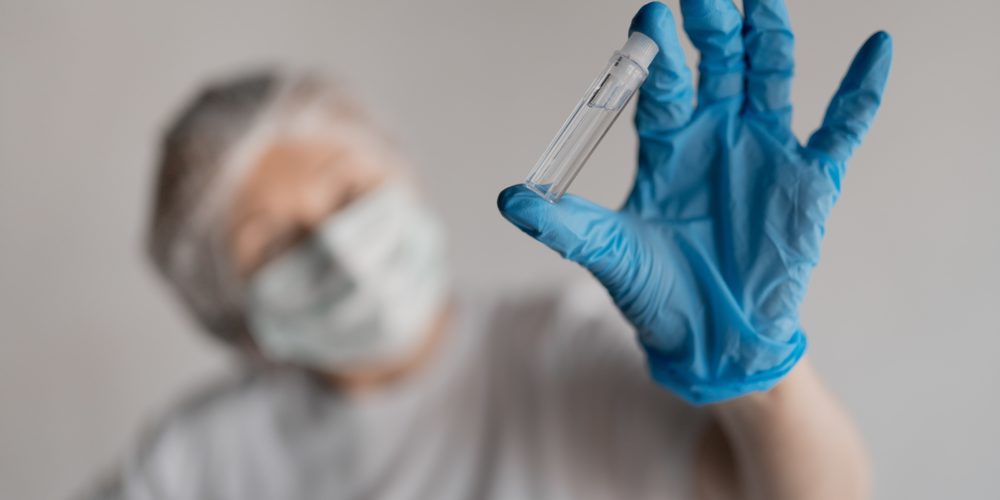
Can You Do a Throat Swab for a Rapid Test for COVID-19?
When you go through COVID-19 testing, you should either be tested by a medical professional or follow your at-home testing kit instructions precisely. Throat swab COVID test accuracy is still not fully tested in the same way nasal swab COVID test accuracy is. Because of this, the medical community currently relies more on nasal swab testing.
If you have recently searched the internet for “how to swab throat for a COVID rapid test,” you may have come across the #SwabYourThroat Twitter trend. Many people are taking to social media with their at-home testing kits and sharing experiences with throat swabbing instead of nose swabbing, or doing a combined throat and nose swab. This unfortunately may not lead to accurate test results, as at-home testing kits in the U.S. are more widely designed for nasal swabbing only.
Accurate testing is vital to containing and isolating cases of COVID-19. Rapid tests also contribute their own issues to achieving accurate results. Let’s dive into some questions surrounding rapid test results and throat swabbing.
What Is a Rapid COVID Test?
A more specific way to ask this question would be, “What is a rapid COVID19 antigen test?” A rapid COVID test commonly refers to an antigen test. You can usually expect to receive antigen test results in approximately 15 minutes, hence the “rapid” descriptor. The other viral testing type is molecular (or PCR) testing, which does not get you results quite as fast. Each works differently to detect whether or not you are infected with COVID-19, and understanding these differences can help explain why one is “rapid” and one is not quite as fast.
Antigen Tests
Antigen tests work by detecting certain proteins on the virus’s surface. These proteins are more present in the body when the virus levels are the highest. As stated, you get results in about 15 minutes. If you have an at-home testing kit, it is most likely an antigen test.
PCR Tests
PCR tests are considered the “gold standard” of COVID-19 testing. This type of testing involves a polymerase chain reaction (PCR) to recognize COVID-19 viral genetic material. Without getting into the finer details of this scientific technique, think of a PCR as making billions of copies of one DNA segment to have more opportunities for analysis and detecting COVID-19. You will more frequently see PCR testing in medical institutions, like hospitals, or at certain testing sites, like ours at BioCollections. Results can come back in as little as 24 hours, but this can sometimes take longer depending on how many people are wanting to be tested.
Choosing which test to take largely depends on why you need the test. Sometimes employers may require you have a negative result from a PCR test before returning to work, and occasionally PCR tests are preferred for proving you not infected for travel purposes. If test availability is an issue and you need to get tested ASAP for your own purposes, go with whichever one is more readily available. Beyond that, understanding the accuracy of each test type can also help you make the best choice for your COVID-19 testing method.
How Accurate Are COVID Tests?
When asking, “How accurate is the rapid COVID test?” versus, “How accurate is the PCR COVID test?” the answer is usually that PCR tests are more accurate than rapid (aka antigen) tests. This is one of the biggest reasons we do PCR testing at BioCollections, as we want to ensure our test patients are getting accurate results.
Additionally, the CDC completed a study that revealed one in five patients with symptoms and confirmed COVID-19 received a negative rapid antigen test result. This is largely due to the manner in which antigen tests detect COVID-19. As we stated above, antigen tests work best when virus levels are the highest in a person’s body. Sometimes testing too early before the viral load has gotten to a detectable level will result in a negative test result when the person is actually infected with COVID-19.
Can You Do a COVID Test Without a Throat Swab or Nasal Swab?
At this time, you can only be diagnosed with COVID-19 via a nasal swab or throat swab. The most common and accurate option for testing is through a nasal swab. Throat swabbing is another method approved by the Centers for Disease Control and Prevention (CDC), but it is less widely used.
The key point to remember about each type of test is to only use each test in the manner it was designed for. Most at-home testing kits available in the U.S. are currently engineered for nasal swab testing only. Using a test for something it was not designed for reduces or completely eliminates your chances of accurate results. This is why you should always follow all at-home testing kit directions exactly as they are written.
For Accurate COVID-19 Testing, Trust BioCollections
Whether you need your first COVID-19 test after experiencing symptoms or you’re looking for a PCR test to confirm an at-home test result, BioCollections is here to help. Based on everything we have explained in this blog, if you are experiencing COVID-19 symptoms but tested negative with an at-home antigen test, we highly recommended having a PCR test done to back those results. We have 20+ years of experience in the field of medical testing, and we are passionate about using our experience to deliver accurate COVID-19 test results. If you need to get tested, schedule an appointment with us online right now to reserve a spot, or if you have more questions, please do not hesitate to contact us.
